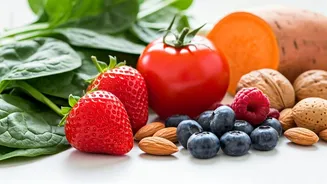Leafy Green Power
Leafy green vegetables are absolute champions when it comes to heart health. Think spinach, kale, and collard greens. These greens are loaded with vitamins,
minerals, and antioxidants, all vital for keeping your heart in tip-top shape. They are rich in vitamin K, which aids in blood clotting, preventing excessive bleeding. Additionally, they’re packed with nitrates, which convert into nitric oxide in your body. Nitric oxide helps relax and widen blood vessels, resulting in improved blood flow and reduced blood pressure. Leafy greens also combat inflammation, a significant contributor to heart disease. The fiber content in these greens assists in lowering cholesterol levels, further safeguarding your heart. Make these vibrant greens a regular part of your meals through salads, smoothies, or sautéed dishes to reap their heart-healthy rewards. Integrating them into your diet is a simple yet effective way to protect your heart.
Berry Brilliant Benefits
Berries, the colorful jewels of the fruit world, offer exceptional benefits for your heart. Strawberries, blueberries, raspberries, and other berries are overflowing with antioxidants. These antioxidants battle harmful free radicals that can damage cells and contribute to heart disease. One of the key antioxidants in berries, anthocyanins, provide the vibrant colors and have been linked to improved blood vessel function and reduced inflammation. Studies have demonstrated that eating berries regularly can lower bad cholesterol (LDL) levels while increasing good cholesterol (HDL) levels, both critical for heart health. Furthermore, the fiber found in berries contributes to better cholesterol management. Enjoy berries in a variety of ways: add them to your morning cereal, blend them into smoothies, or simply snack on them as a refreshing treat. They are not only delicious but also a powerful ally in the fight for a healthy heart.
Avocado's Hearty Help
Avocados, with their creamy texture and distinctive flavor, are a nutritional treasure trove for your heart. They are abundant in monounsaturated fats, the kind that helps to lower LDL cholesterol while increasing HDL cholesterol. Avocados are also rich in potassium, a mineral crucial for regulating blood pressure. High blood pressure is a major risk factor for heart disease, and potassium aids in counteracting the harmful effects of sodium. Additionally, avocados provide antioxidants and fiber, which work together to safeguard your heart. The fiber supports healthy cholesterol levels, while the antioxidants combat inflammation. You can enjoy avocados in many ways – from a simple avocado toast to a creamy guacamole dip or even added to salads and smoothies. Regular consumption of avocados can make a substantial difference in maintaining a healthy cardiovascular system.
Nuts and Seeds' Power
Nuts and seeds are miniature powerhouses packed with heart-healthy nutrients. Almonds, walnuts, chia seeds, and flaxseeds are excellent sources of healthy fats, fiber, and various minerals. These components collectively offer significant benefits for your cardiovascular health. The healthy fats found in nuts and seeds help lower LDL cholesterol levels and reduce the risk of heart disease. Fiber is also abundant, helping to regulate cholesterol and keeping you feeling full, which is beneficial for weight management, another key factor in heart health. Furthermore, nuts and seeds contain antioxidants and minerals like magnesium, which helps relax blood vessels and manage blood pressure. Make nuts and seeds a regular part of your snacking routine. Sprinkle them on your breakfast cereal, salads, or add them to your trail mixes. Just remember to eat them in moderation to gain maximum heart-healthy benefits.
Whole Grains' Heart Boost
Whole grains are essential for a heart-healthy diet. They include options such as oats, brown rice, quinoa, and whole-wheat bread. Unlike refined grains, whole grains retain all parts of the grain kernel. This includes the bran, germ, and endosperm, thus, preserving important nutrients such as fiber, vitamins, and minerals. The fiber content in whole grains helps lower LDL cholesterol levels and reduces the risk of heart disease. Furthermore, whole grains provide essential nutrients such as magnesium and potassium, which help maintain healthy blood pressure. Replacing refined grains with whole grains is a simple dietary change that can provide huge benefits for your heart. Make whole-grain bread and pasta your staples, and incorporate oats or quinoa into your daily meals to support a healthy cardiovascular system. These whole grains offer sustained energy and vital nutrients, making them a cornerstone for a heart-healthy lifestyle.


















